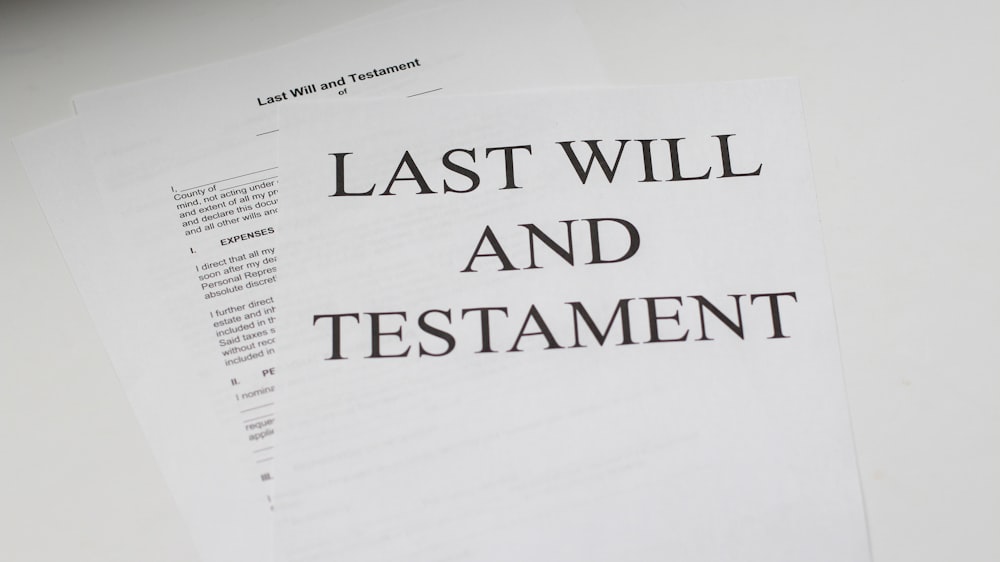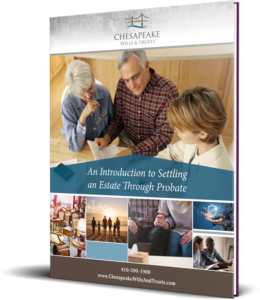The Maryland Probate process can be confusing and, at times, very complex. Read the article below to get up to speed on what to expect from Maryland Probate Court, the process as a whole, and what your next steps might be.
Check out the YouTube video below to learn about the processes involved in Maryland Probate court, from estate planning attorney, Frank Gray.
Subscribe to our channel on YouTube for more Maryland estate planning videos.
What is Probate?
Simply put, probate is the court supervised process of validating a will, paying off debts and distributing property. This concept seems simple, but has several complicated aspects.
The Major Difference: Probate Asset vs Non-Probate Asset
A probate asset is an asset titled only in the name of the decedent when they died.
Probate Asset Example: Mom had a bank account solely in her name.
The opposite of that is a non-probate asset.
A non-probate asset is an asset not titled in the name of the decedent at the time of their death, even though the decedent had control over it before their death.
Non-Probate Asset Example: You might have a 401k in your name, but have a beneficiary designated. So although you own it during your lifetime, the second you die, it goes to the designated beneficiary.
Why Does It Matter?
- Probate assets go through probate
- Non-probate assets do not go through probate
- Non-probate assets do go to the gross estate
Maryland Probate: The Three-Phase Process
The following only applies to the state of Maryland. Every state law is different.
Maryland probate has three simple phases:
- Opening the estate
- The administrative phase
- The distributions phase
Opening the Estate

Paperwork is filed in order to open the estate. A personal representative will be established either through a will or by preference of the law.
Preference of the law sets who the personal representatives can be when a will does not. It generally gives preferences to a spouse or children. After establishing who the personal representative is going to be, the probate court will then give the personal representative letters of administration.
Letters of administration are the court orders that allow a person settle the estate of whom they are representing.
The Administrative Phase
The personal representative will then begin identifying and valuing assets. The letters of administration will allow for transitioning bank accounts into an estate account.
In other words, bank accounts in the name of the estate of the decedent are unlocked. That’s important because money is needed in order to continue to preserve the asset plus making payments such as insurance and mortgage.
In the administrative phase, creditors are also notified. This happens either through a general notice or by notifying specific creditors through specific paperwork. Valid claims are also paid during this phase. An example of a valid claim may be funeral expenses.
Fees and taxes are paid in the administrative phase. Probate assets plus non-probate assets make up the gross estate. Based on the value of the gross estate, there’s a probate fee that’s to be paid to the register of wills. Below is a fee chart. Be sure to check your specific county – Anne Arundel estate planning will be slightly different than others, for example.
Go here for the Maryland Probate Fees Chart
Taxes are also handled during the administrative phase. There could be an inheritance tax: a state tax of 10% based on the relationship of the person who inherited the property. If you leave property to your kids, they aren’t going to have to pay an inheritance tax because of their relationship to you.
There are also estate taxes to deal with. The estate taxes occur at both the state and federal level. The state taxes are paid to the controller of the treasury. The federal taxes are paid to the IRS.
The Distributions Phase
In the final phase, distributions are made from the leftover assets. The will provides who gets what, when and how.
If no will is in place it is called dying intestate and the government determines who are the heirs. This depends on whether or not the deceased was married or if they had children. This is also one of the many times when proper estate planning pays off. Learn more about planning ahead for this in the following video by estate planning attorney Greg Jimeno.
Need Advice on the Probate Process or Planning Your Estate?
At Chesapeake Wills & Trusts, we’re here to help you protect your family, assets and life savings.
As Maryland estate planning attorneys, we are passionate about educating our clients so they can make the right decisions to secure a safe, happy, financially stable future.
Contact Us Now, Download Our Free Book & Sign Up For Our Free Estate Planning Webinar
If you need help planning for the future, contact us now and sign up for our free online Estate Planning Webinar.
And, be sure to download a free copy of An Introduction to Settling an Estate Through Probate written by Maryland estate planning attorney Greg Jimeno.


